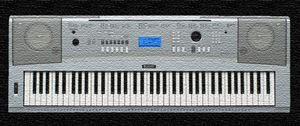
Yamaha PSR is the most playful yamaha keyboard for different melodies and styles, beautiful sound and allows many types of improvisation with rhythms from around the world. Enjoy our musical world for free.
How to use style files for yamaha keyboard and how to play more beautiful music with them. Yamaha portable keyboards include the Yamaha PSR K1, Yamaha PSR 170, Yamaha PSR 172, Yamaha PSR 175, Yamaha PSR 273, Yamaha PSR 275, Yamaha PSR 290 , Yamaha PSR 292, Yamaha PSR 350, Yamaha PSR 550, Yamaha PSR 1100, Yamaha PSR 2100 and Yamaha PSR 3000.
Other popular portable keyboards are the Yamaha DGX, Yamaha Clavinova, Yamaha Tyros, Yamaha Motif, Yamaha MIDI keyboards, and many more
General Midi - is an addition to the MIDI standard which ensures that any GM-compatible music data can be accurately played by any GM-compatible tone generator, regardless of manufacturer. The GM mark is affixed to all software and hardware products that support GM System Level.
XGlite - As its name implies, "XGlite" is simplified version of Yamaha's high-quality XG tone generation format. Naturally, you can play back any XG song data using an XGlite tone generator. However, keep in mind that some songs may play back differently compared to the original data, due to the reduced set of control parameters and effect.
How many keys does the keyboard have?.
Keyboards have varying numbers of keys, the most popular is 61 keys, while some starter or children's keyboards have 49. A full size keyboard will have 76 keys and digital pianos will have 88 keys.
How to make your mind up? It depends on 4 factors - the music you would like to play, if you have room for a full size keyboard or if you will have to settle for a smaller one, whether you want the keyboard to be movable and the price you are willing to pay.
A keyboard with 61 keys will be fine for most pieces of music, as there will be five octaves set in the middle range, which will allow you to play the majority of music, but if you want to play some classical arrangements, particularly The Moonlight Sonata, you'll find you run right out of keys at the bottom of the range. Some keyboards permit you to transpose the pitch down or up an octave so if you do wish to play this kind of music infrequently you can use this function to gain an additional octave and enable you play it.
A 61 key keyboard is smaller compared to a 76 key keyboard and easier to carry around so if your space is limited or you would like to take your keyboard out on gigs this might be the best keyboard for you.
A keyboard with 76 keys will allow you to play almost any piece of music. It needs more space than a 61 key keyboard and is less easy to carry around.
If you want the absolute best quality and sound and desire something that closely emulates an acoustic piano you should consider an 88 key digital piano.
What functions do you need?
Electronic keyboards are crammed with features, many of which are fun although not really essential. Bear in mind which functions you really need when choosing a keyboard to buy:
Different voices. As electronic keyboards work by storing sound samples and playing them when a key is struck it is possible for them to emulate any orchestral instrument. So you can play the keyboard and have it sound like any sort of acoustic, wind or percussion instrument and so on. Digital pianos do not have the same range of voices as these are built to take the place of an acoustic piano.
Touch Response Sensitivity: With a traditional piano you can vary the loudness of the sounds played by varying the pressure on the keys. To make this possible when playing an electronic keyboard sensors underneath the keys are used to transmit a signal allowing the controller to make adjustments to the volume of the music dependent on how hard the keys are struck. This is a really useful feature, making an electronic keyboard sound much closer to a traditional piano.
Is a MIDI interface important to you ? if you would like to record what you play and send it to a PC you may want to be sure that a MIDI interface is included to let you do this. It is feasible to use the USB interface and software on the personal computer to emulate a MIDI interface but the real deal is much better and you'll finish up with a far higher quality recording
Built in Lessons: Some musical keyboards come with in-built lessons which will help you learn to play. You select a song you want to learn and the hand ( right, left or both ) you would like to play with. The display shows you each note you need to play and waits for you to play the correct note. When you have finished the song you are given feedback as to how you did.
Split Keyboard Mode: This allows you to play a different instrument with either hand, for instance you might play piano with one hand and organ with the other.
Musical Accompaniment: Some electronic keyboards are available with built in musical styles you can play together with. Choose a style ( e.g. waltz, rhythm and blues, latin) and the keyboard will play rhythm, bass and chords in that style while you play the melody, an alternative to playing along with a band.
Recording Feature: The keyboard can record your playing for later playback on the keyboard or upload to a P.C.
Metronome: One of the most significant parts of learning how to play a keyboard is in getting the speed of the music right. A metronome is very useful to help a beginner achieve this.
For direct advertising on this page - Skype "D_A_N_C_E_R" - Very low prices.
